| | | OFFLINE | | Post: 16.787 | Registrato il: 28/08/2005
| Utente Gold | |
|

 THE BISHOP OF ROME
THE BISHOP OF ROME
AT THE CAPITOLINE
Translated from

At 10:40 Monday morning, the Holy Father Benedict XVI came to the Campidoglio for a visit. On his arrival the Pope - accompanied by his Vicar in Rome, Cardinal Agostino Vallini, among others - was greeted by the Mayor of Rome, Gianni Alemanno and his wife.
Afterwards, the Pope greeted the councilors and other city officials in the Tapestry Hall, and in the Hall of Flags, he signed the 'Golden Book' of the Commune of Rome.
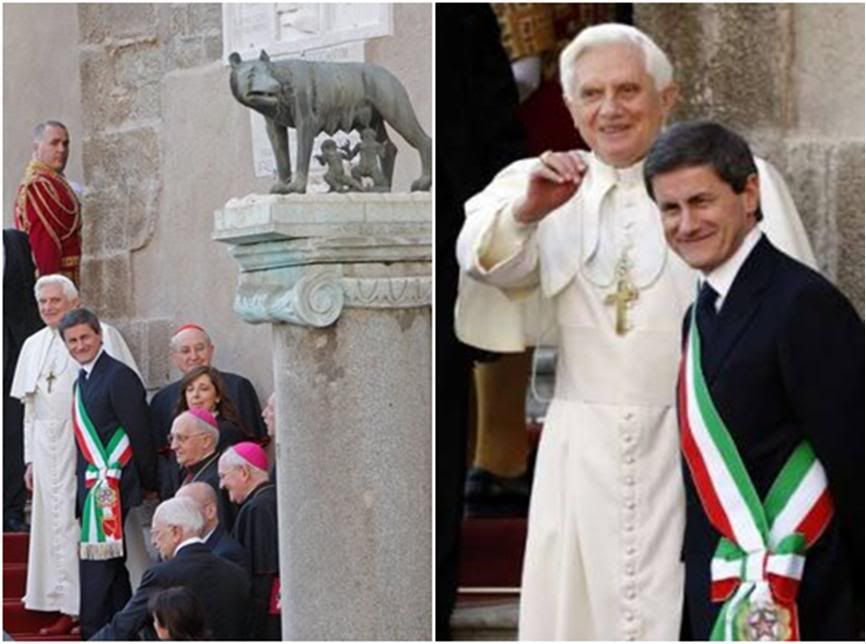
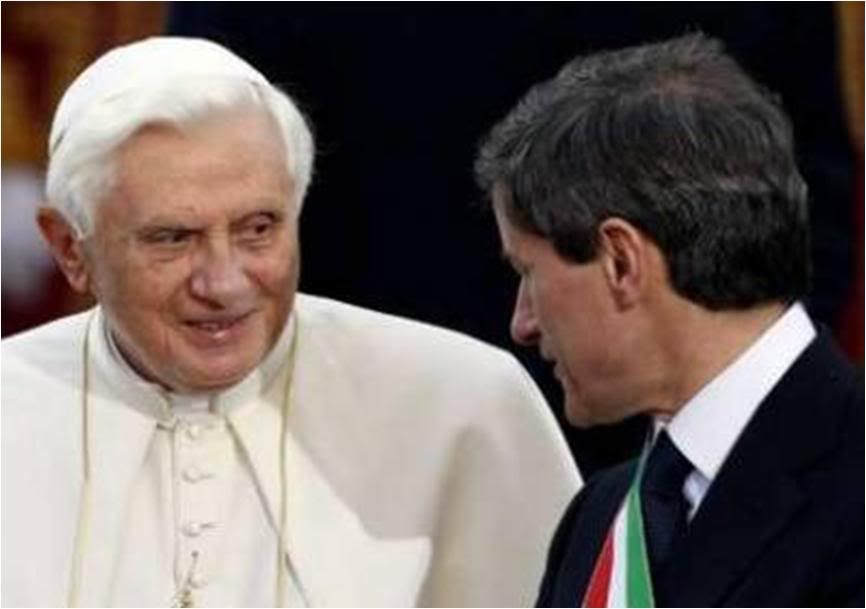
On the first floor of the Palazzo Senatorio [Rome's City Hall], the holy Father entered the Mayor's office and proceeded to the balcony that looks down on the Roman Forum.
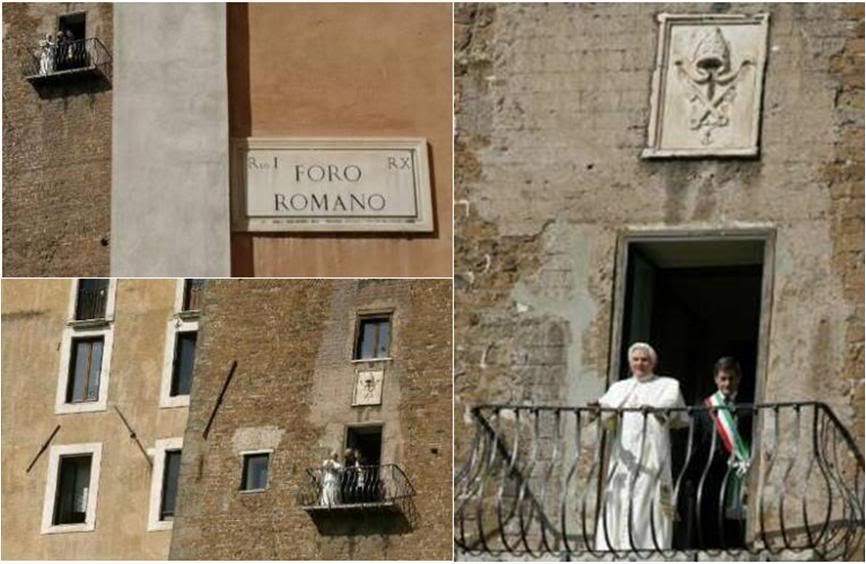
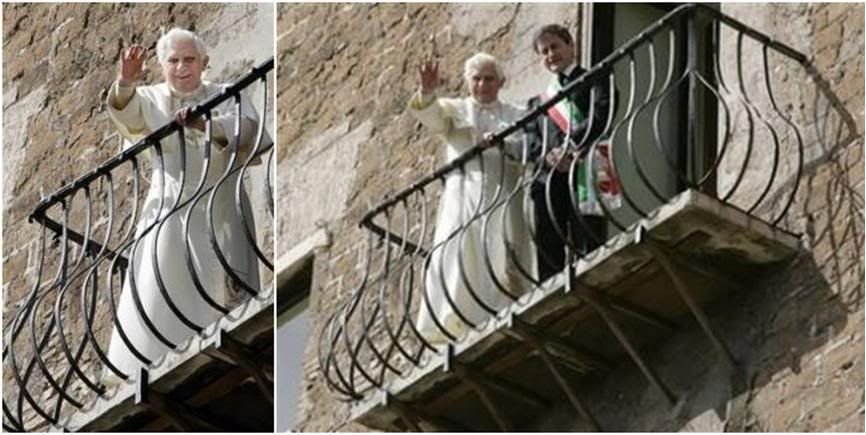
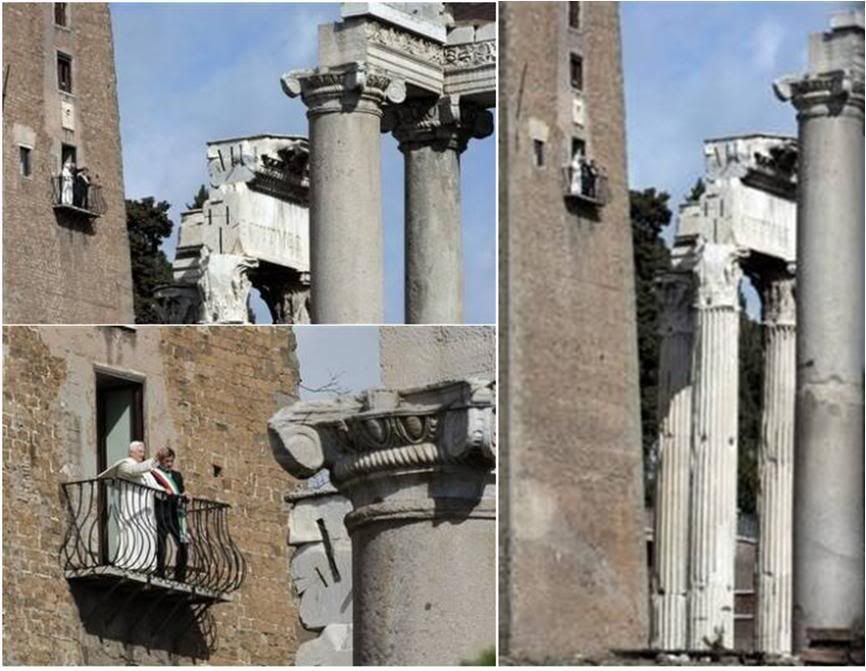
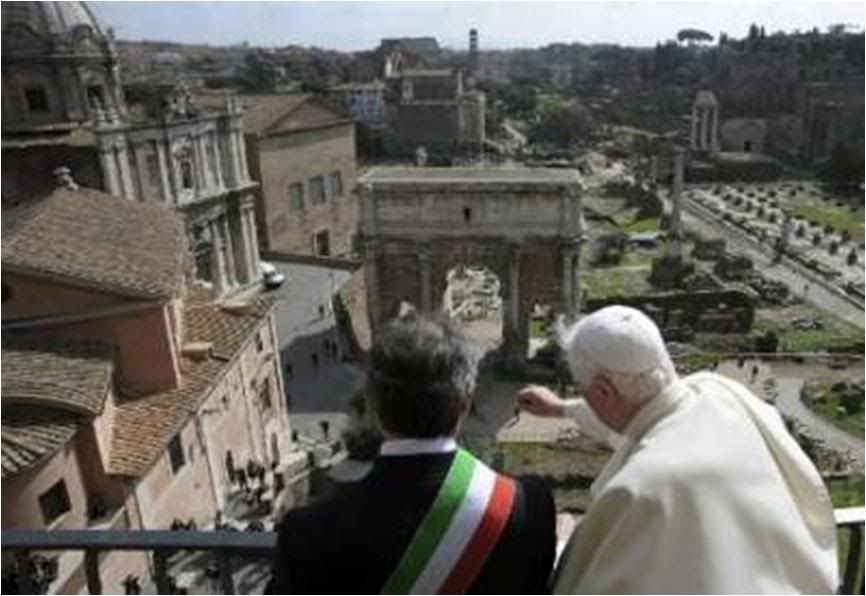
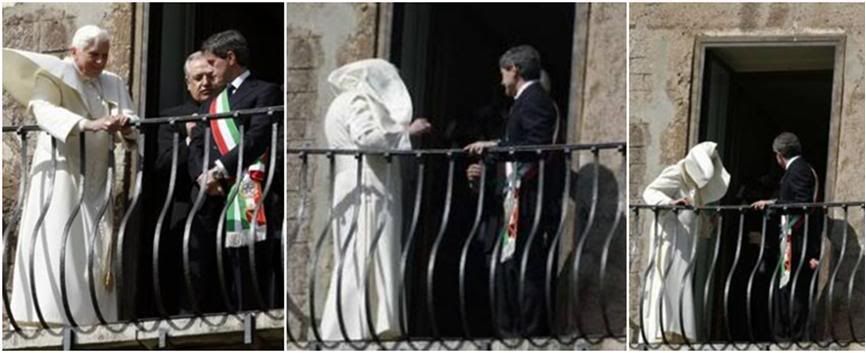
Then, in the Aula Giulio Cesare, the Hon. Marco Pomarici, president of the communal council, declared an extraordinary session of the Council open.
Following a greeting from Mayor Alemanno, the Holy Father addressed the city officials. Here is a translation of the address:
ADDRESS TO THE CITY COUNCIL
Mr. Mayor,
Mr. President of the Communal Council,
Ladies and gentlemen councillors of the Commune oF Rome.
Distinguished officials,
Dear friend!:
As we have been reminded, this is not the first time that a Pope has been greeted with such warmtn in this Palazzo Senatorio, and takes the floor in this solemn Council Hall, where the highest representatives of the city administration meet.
The annals of history record tHE brief visit of the Blessed Pius IX to the Piazza del Campidoglio after his visit to the Basilica of Ara Coeli on September 16, 1970.
Much more recent were the visits by Pope Paul VI on April 16, 1966, followed by that made by my venerated predecessor, John Paul II, on January 11, 1996.
They are acts which show the affection and esteem that the Successors of Peter, pastors of the Roman Catholic community and the universal Church, have always felt for Rome, center of Christian and Latin civilization, "welcoming mother of peoples"(cfr Prudenzio, Peristephanon, carme 11, 191) and "disciple of truth' (cfr Leo the Great, Tract. septem et nonaginta).
That is why it is with understandable emotion that I speak during the course of my visit today. I take the occasion to express above all, Mr. Mayor, my appreciation for the kind invitation to visit the Campidoglio that you extended to me at the start of your mandate as the prime magistrate of the 'Urbe' [city].
Thank you, as well, for the profound expressions with which you welcomed me in the name of your colleagues. I followed attentively the reflections offered by you, the Mayor, as well as the Council President, and understand thereby the determination of this administration to serve the city by aiming at its true and integral well-being - material, social as well as spiritual.
I extend my heartfelt greetings to the councilors of the Commune, to the representatives of the Italian government, to the authorities of Rome, and the entire Roman citizenry.
With my presence today on this hill, seat and emblem of the history and mission of Rome, I must renew my assurances of the paternal attention that the Bishop of the Catholic community feels not only for its members but for all Romans and all those who from various parts of Italy and the whole world, come to the capital for religious, touristic, or work reasons, or to stay here and integrate themselves into the fabric of the city.
I am here today to encourage the commitment, which is far frome asy, taken by you administrators in the service of this singular metropolis: to share the expectations and hopes of the residents and to listen to their concerns and problems, problems of which you have made yourselves the spokesmen in this place, which is the natural and dynamic center of plans that are going on in the 'construction site' of Rome in the third millennium.
Mr. Mayor, I saw in your address a firm purpose to work so that Rome may remain the beacon of life and freedom, of moral civility and sustainable development, promoted with respect for the dignity of every human being and his religious faith.
I hasten to assure you and your co-workers that the Catholic Church, as always, will not fail to give active support to every cultural and social initiative addressed at promoting the authentic good of every person and of the City in its entirety.
As a token of this collaboration I am offering the Compendium of the Social Doctrine of the Church with affection to the Mayor and other city administrators.
Mr. Mayor, Rome has always been a welcoming city. Especially in the last centuries, she has opened her universities, as well as her civil and ecclesiastical research centers to students from all parts of the world who, returning to their countries, are then called to play roles and functions of high responsibility in various sectors of society, as well as in the Church.
This, our city, like the rest of Italy and all mankind, now finds itself having to meet unprecedented cultural, social and economic challenges because of profound transformations and numerous changes that have come about in the past few decades.
Rome has become increasingly populated by people from other nations who belong to different cultures and traditions, and as a consequence, she now has the face of a multi-ethnic, multi-religious metropolis, in which sometimes integration is difficult and complex.
On the part of the Catholic community, it will never fail to contribute in order to find more adaptable modalities to protect the fundamental rights of persons in the face of the law.
As you stated, Mr. Mayor, I too am convinced that by drawing new lymph to the roots of its history, which was shaped by ancient law and Christian faith, Rome will find the strength to demand from all a respect for the rules of civil coexistence, and to reject every form of intolerance and discrimination.
Allow me also to note that the episodes of violence that have been deplored by everyone manifest a deeper unease. They are the signs, I would say, of a true spiritual poverty which afflicts the heart of contemporary man.
The elimination of God and his law, as a condition for realizing man's happiness, has not in fact achieved its objective. On the contrary, it deprives man of the spiritual certainties and hope that are necessary to face daily difficulties and challenges.
When, for instance, a wheel lacks its central axle, then its motor function fails. Similarly, morality does not fulfill its ultimate end if it does not pivot on the inspiration of God and submission to him, source and judge of every good.
In the face of the preoccupying weakening of human and spiritual ideals that had made Rome the 'model' of civilization for the entire world, the Church, through its parochial communities and other church associations, is engaged in detailed educational work intended to make others, particularly the new generations, rediscover the perennial values.
In the post-modern years, Rome should re-appropriate its deepest soul, its civic and Christian roots, if it wants to be the promoter of a new humanism which has man at its center, recognized in his full reality.
Man, when disconnected from God, would be deprived of his transcendent calling. Christianity is the bearer of a luminous message of the truth about man, and the Church, which is the depository of such a message, is aware of its own responsibility vis a vis contemporary culture.
How many more things I would like to say at this time! As the Bishop of the city, I cannot forget that even in Rome, because of the present economic crisis as I said earlier, the number is growing of those who, after losing their jobs, find themselves in precarious conditions, unable to meet the financial commitments they had assumed, for instance in acquiring a home or relocating.
Thus a concerted effort among the different institutions is needed to help those who live in need. The Christian community, through its parishes and charitable structures, is already engaged in sustaining on a daily basis so many families who labor to maintain a dignified life and, as has happened recently, are ready to work with the authorities who are willing to prosecute the common good.
Even in these cases, the values of solidarity and generosity, which are rooted in the heart of Romans, can be sustained by the light of the Gospel, so that everyone may once again feel responsible for the needs of the poorest, feeling themselves part of one family.
In effect, the more one can mature in every citizen the consciousness of feeling responsible in the first person for the life and the future of the residents of our city, the more confidence can grow that we can overcome the difficulties of the present time.
What to say of the families, of children and young people? Thank you, Mr. Mayor, that on the occasion of my visit, you have offered me a sign of hope for the youth, giving it my name, that of an old Pontiff who looks confidently to the youth and prays for them every day.
Families, the youth, can hope in a better future to the degree in which individualism makes way for feelings of brotherly collaboration among all the components of civil society and the Christian community.
May this work in construction be an impetus for Rome to to realize a social fabric of acceptance and respect, where the encounter between culture and faith, between social life and religious testimony, may work to form communities that are truly free and inspired by sentiments of peace.
A singular contribution can be made to this by the 'Observatory for Religious freedom" that is being formed, to which you referred just now,
Mr. Mayor, dear friends, at the end of my intervention, allow me to turn my attention towards our Lady with her Child who for several centuries has watched maternally over your work of civic administration in this hall.
May you all always be in agreement about service to our beloved city, to which the Lord has called me to exercise my episcopal ministry. On each of you I invoke from the heart the abundance of divine blessings,and for everyone I assure my remembrance in prayers. Thank you for your hospitality.
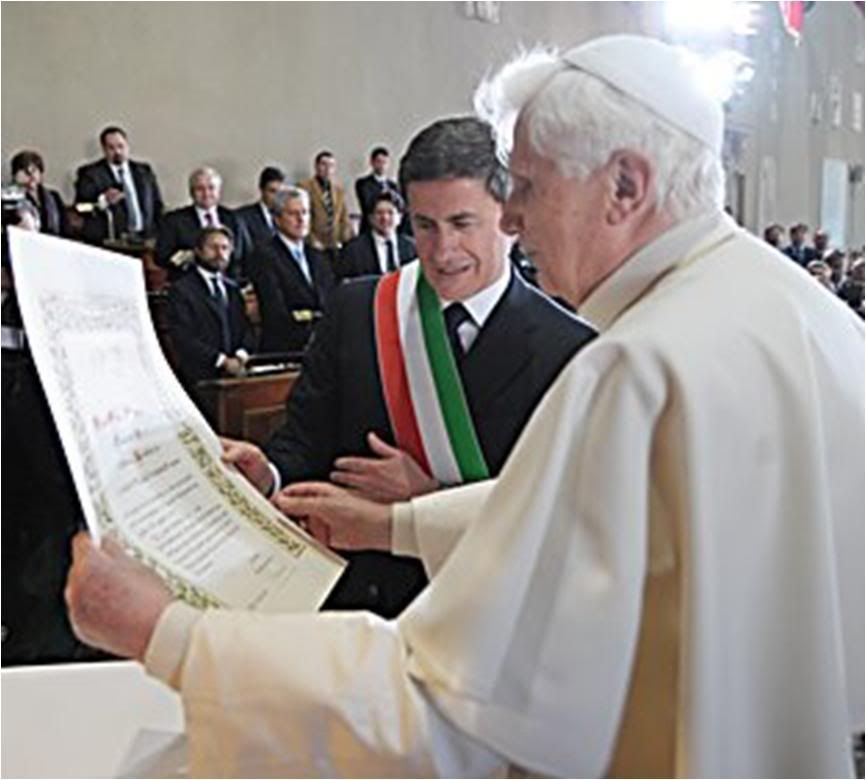 The Holy Father looks at the title to a Roman property where the city will put up a center named in his honor for assistance to young people with problems.
The Holy Father looks at the title to a Roman property where the city will put up a center named in his honor for assistance to young people with problems.
After his address to the city council, he went out to the Loggia of Palazzo Senatorio to greet the citizens gathered on he Piazza del Campidoglio. Among them were representatives of Roman volunteer associations, various immigrant groups and guests of the various community centers of Rome.
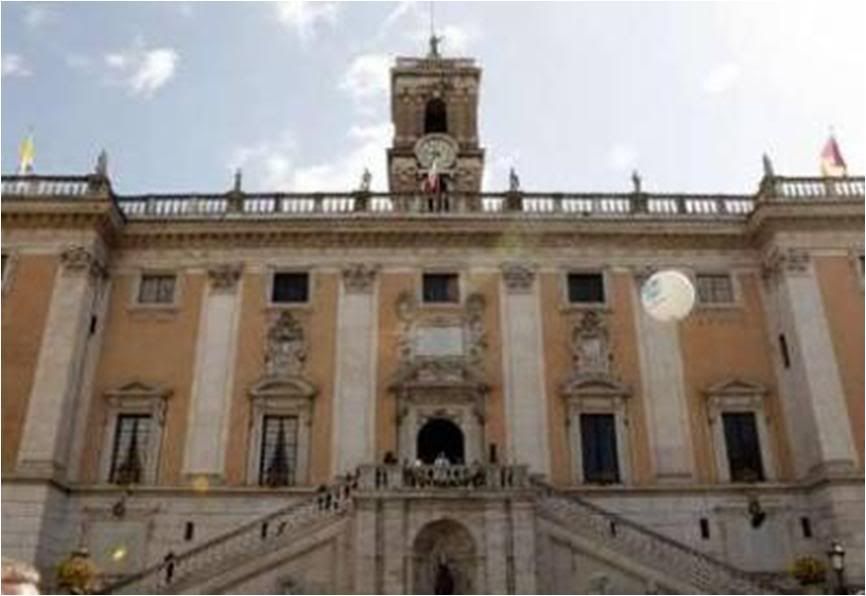
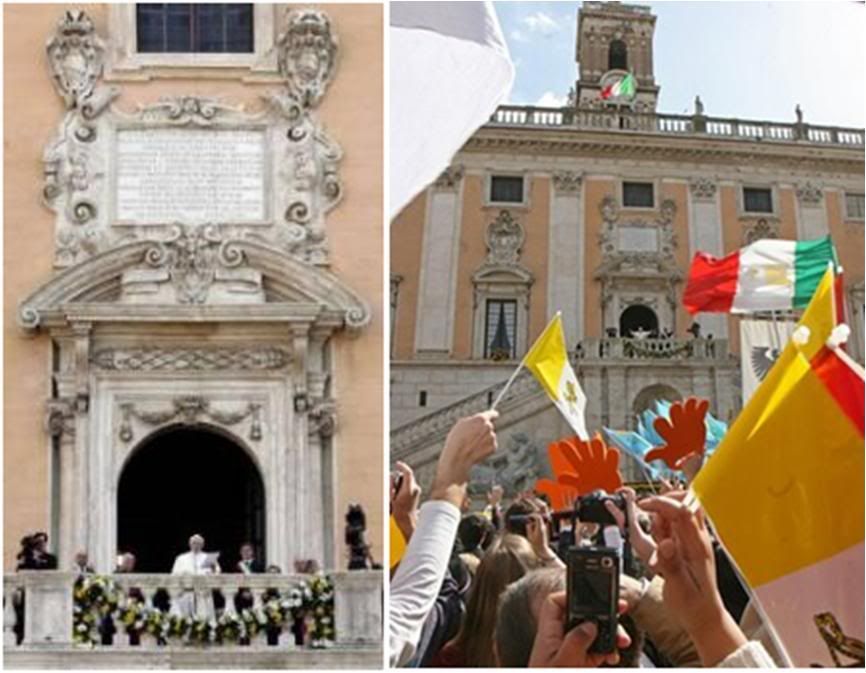
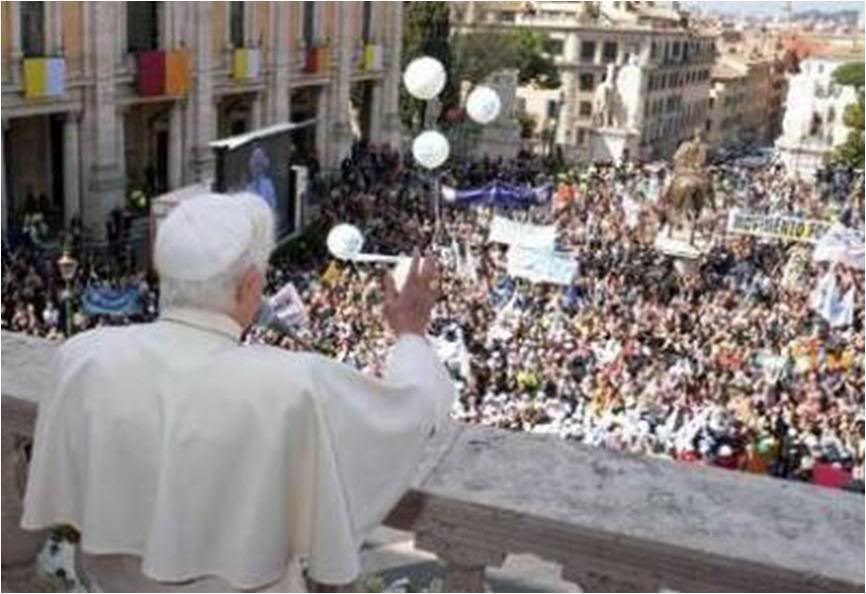
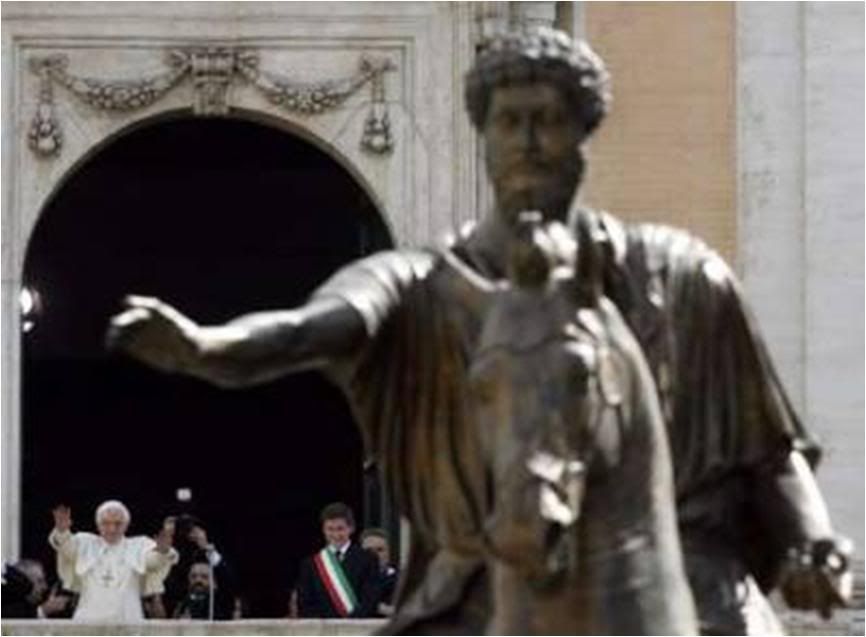
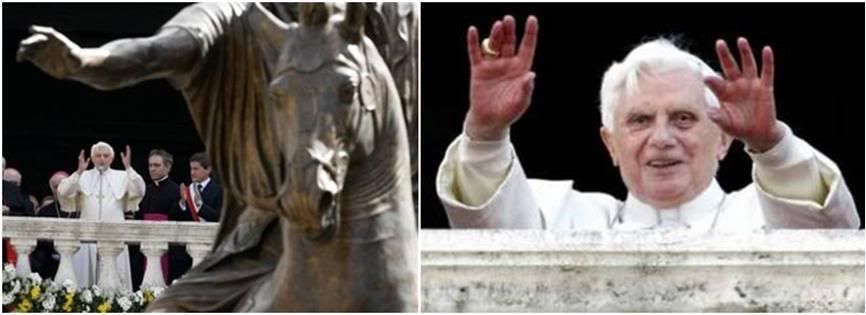
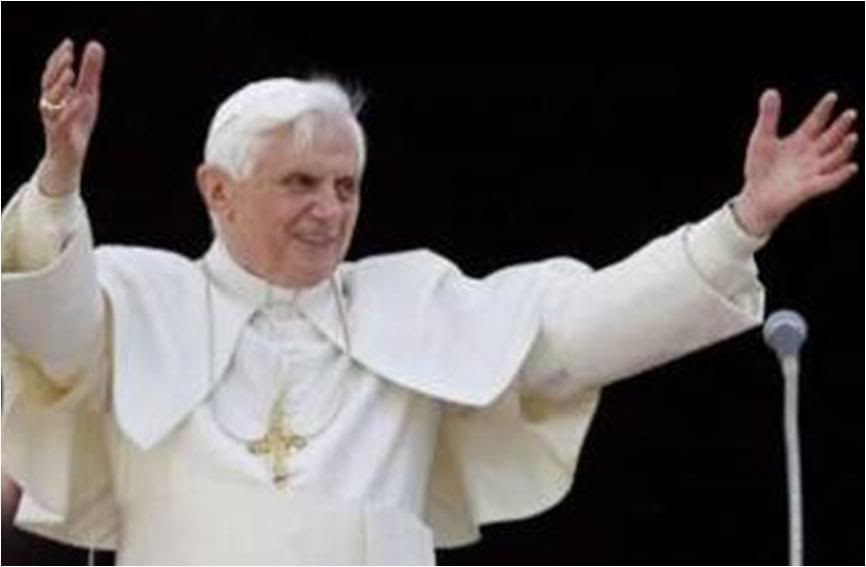 Here is a translation of the Holy Father's address to the people of Rome:
Here is a translation of the Holy Father's address to the people of Rome:
ADDRESS TO THE PEOPLE OF ROME
Dear brothers and sisters,
After meeting with the administrators of the city, I am very happy to greet all of you who are gathered in this Piazza del Campidoglio, towards which the colonnade, with which Bernini completed the splendid structure of the Vatican Basilica, reaches out as in an ideal embrace.
Having lived in Rome for so many years, I have become somewhat Roman, but I feel more Roman as your bishop. It is therefore with more vivid participation that I address, through each of you, all our fellow citizens whom you represent today to some degree: to families, to communities and parishes, to the children, to young people and the aged, to the disabled and the sick, to volunteers and social workers. to immigrants and pilgrims.
I thank the Cardinal Vicar, who is with me on this visit, and encourage and follow the commitment of all - priests, consecrated and the lay faithful - who work together actively with public institutions for the good of Rome, its suburbs and its neighboring areas.
Several days ago, while meeting with the parish priests and clergy of Rome, I said that the Roman heart is a 'heart of poetry', in order to underscore that beauty is almost "its privilege, its natural charism".
Rome is beautiful for its sntiquities, for its cultural institutiions and monuments which narrate history, for its churches and multiple art masterworks.
But Rome is beautiful above all for the generosity and saintliness of so many of its children who have left eloquent traces of their passion for the beauty of God, the beauty of a love that does not fade nor age.
Witnesses to this beauty were the Apostles Peter and Paul and the ranks of martyrs at the beginning of Christianity: In the course of centuries, many men and women,Roman by birth or by adoption, have given themselves in the service of young people, the sick, the poor and all who are needy.
I will limit myself to citing only a few: the deacon St. Lawrence, St. Francesca Romana, whose feast day we celebrate today, St. Philip Neri, St. Gaspare del Bufalo, St. Giovanni Battista De Rossi, St. Vincenzo Pallotti, Blessed Anna Maria Taigi, and the Blessed spouses Luigi e Maria Beltrami Quattrocchi.
Their example shows that when a person meets Christ, he does not remain closed in himself, but opens up to the needs of others, in every field of society, and places the good of all before his own interests.
We truly have need of such men and women in our own time, when not a few families, not a few young people and adults, are in precarious and even tragic situations - situations which can be overcome only together, as the history of Rome itself shows, which has known many other such difficult times.
I am reminded in this respect of a verse from the great Latin poet Ovid who, in one of his elegies, encouraged the Romans of his time: "Perfer et obdura: multo graviora tulisti" – support and resist: you have overcome situations that were much more difficult (cfr Trist., lib. V, el. XI, v. 7).
Beyond the necessary solidarity and the dutiful commitment of everyone, we can always count on the sure help of God who never abandons his children.
Dear friends, when returning to your homes, communities and parishes, tell everyone you meet that the Pope assures them of his understanding, of his spiritual nearness, and his prayers.
To everyone, especially the sick, the suffering, and those who are in the gravest difficulties, bring my remembrance and the blessing of God, which I now invoke on you through the intercession of Saints Peter and Paul, of San Francesca Romana, co-patron of Rome, and especially of Maria Salus Populi Romani - Mary. health of the Roman people. May God always bless and protect Rome and all its residents.
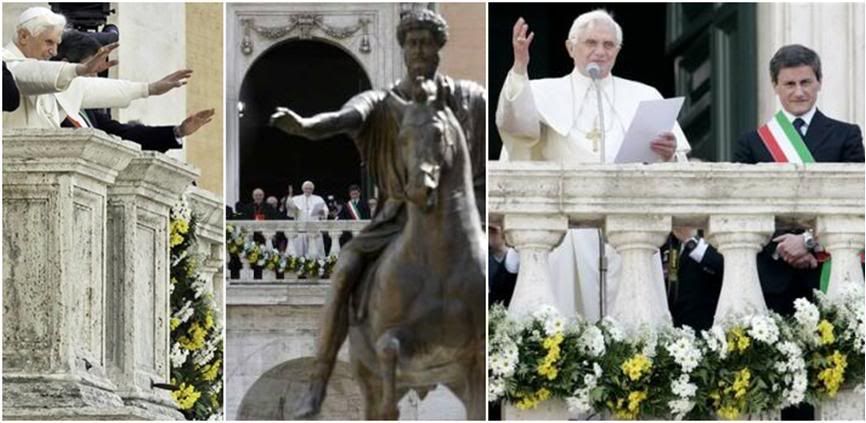
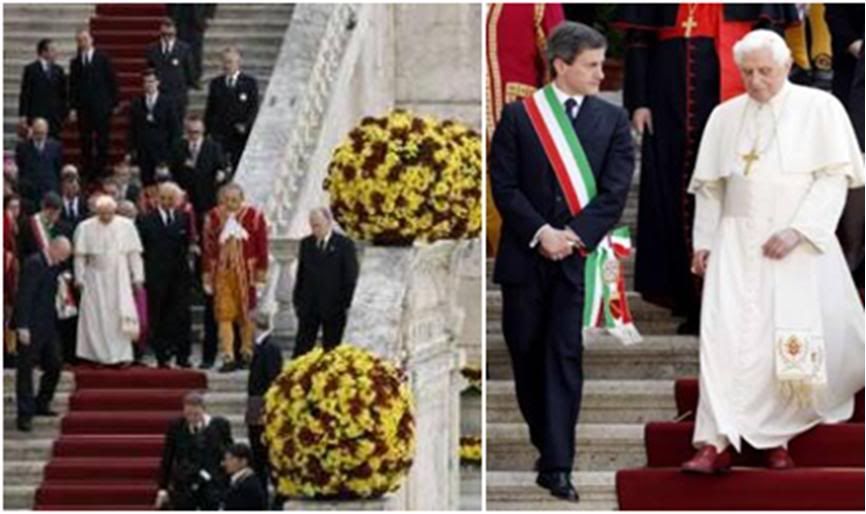
After addressing the crowd, the Pope went down the outer stairway of the Palzaazo Senatorio, said goodbye to his hosts, and proceeded to visit the nearby Monastery of Santa Francesca Romana.
*********************************************************************
What a lovely day for the Holy Father - the living icon of Rome - joining the monumental icons of the Eternal City, from Romulus and Remus, the city's legendary founders, and their she-wolf 'nursing mother', to the Forum of the Caesars and Marcus Aurelius via Michelangelo's civic masterpiece and Roman centerpiece in the Campidoglio... What a day of photo opportunities!
And just my luck to be away the whole day on such a momentous day. Have lots of catching up to do for the Forum. I've just barely survived Day-1 of my biennial ordeal with the state inspectors. I think it may take another 2-3 days, as we have two laboratory sites that must maintain certification.
[Modificato da TERESA BENEDETTA 10/03/2009 11:12] |